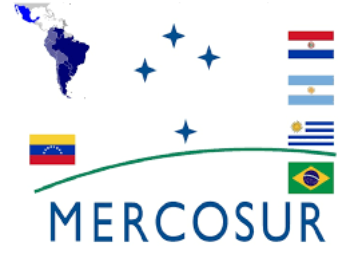Argentina, Brazil, and Paraguay have aligned against the Venezuelan government and threatened its membership within Mercosur, the Southern Common Market that includes Argentina, Brazil, Paraguay, Uruguay, and Venezuela. The Maduro Administration will have until December 1 to meet several hundred Mercosur obligations or the group will relegate the country to an associate, rather than a full, member.
In response, the Venezuelan government has rejected the position of Argentina, Brazil, and Paraguay as a right-wing attempt to isolate the socialist country. Indeed the maneuver highlights Venezuela’s increasingly difficult position in a changing regional landscape.
Trouble has been brewing for several months. While the Venezuelan government was initially scheduled to assume the pro tempore presidency of Mercosur in July, these same countries successfully prohibited the Venezuelan presidency and, due to political and economic concerns, have threatened to suspend Venezuelan membership within the group.
As pro tempore president, the Venezuelan government would have represented the group before other international bodies, including the European Union, which Mercosur has been negotiating agreements with. Despite Uruguay’s initial support for the Venezuelan presidency, the remaining Mercosur members refused to support the transition. Instead, they decided to collectively maintain the presidency over the next six months.
In June, Paraguay took the lead on criticizing the Venezuelan government and its commitments to democracy and human rights. On June 30, the Paraguayan Foreign Minister Eladio Loizaga stated that whatever “member presides over Mercosur, it must be committed with the principles based on human rights as stipulated in the Asunción founding charter, and most specifically abiding by the democratic perception of the situation … A country that presides Mercosur must have very strong internal peace. Without consensus, this process cannot happen.” Loizaga also claimed that his government was not consulted by the Uruguayan government on the transfer of power.
On July 6, following criticism from Paraguay, the Brazilian Foreign Ministry sought to postpone the Venezuelan government’s assumption of power due to the Venezuelan government’s inability “to complete several institutional rules.” Brazilian Senator Ana Amélia Lemos told reporters that a “government that maintains political prisoners, persecutes opponents, disrespects the legislative body and interferes with the judiciary cannot preside over Mercosur.”
Brazilian Foreign Minister José Serra has echoed these same criticisms concerning democracy and human rights in Venezuela. In response to these criticisms from Brazil, Venezuelan Foreign Minister Rodríguez stated that “the Bolivarian Republic of Venezuela rejects the insolent and immoral declarations of the de facto Foreign Minister in Brazil.” Despite the criticisms, the Venezuelan government claimed that it was assuming the presidency.
According to the New York Times Editorial Board, these criticisms of the Venezuelan government show “that neighboring countries are starting to take a harder line against Venezuela’s president, Nicolás Maduro, whose authoritarian and reckless policies have plunged his country into economic and political crisis.” For its part, the Uruguayan government had initially supported the Venezuelan presidency, and the Uruguayan government was indeed prepared to hand over power to the Venezuelan government, which, according to Mercosur’s rules, requires a transition of power every six months.
On July 11, representatives from Mercosur countries met to discuss the transition of the pro tempore presidency to the Venezuelan government. Both Brazil and Paraguayan leaders had previously voiced concerns about the existence of democracy and human rights within Venezuela. As a result, the two countries refused to support to the transition from Uruguay to Venezuela.
At the meeting, Paraguayan Foreign Minister Eladio Loizaga stated that he could not offer support for the Venezuelan presidency unless the Maduro Administration made some changes. Loizaga suggested that Venezuelan President Nicolás Maduro let “political prisoners free, [make] gestures that show a commitment to democratic cohabitation and human rights, otherwise there will be no consensus to deliver the Mercosur presidency to Venezuela.” Loizaga said that he was willing to provide President Maduro with more time to make democratic changes in order to receive Paraguayan support.
At the conclusion of the meeting, representatives agreed to take a two-day recess and resume discussions on how to proceed at a later date. Due to the absence of a unanimous decision by that point though, the transition from Uruguay to Venezuela was indefinitely delayed. In the wake of these events, President Maduro asserted that “the South American right-wing oligarchy cannot kidnap Mercosur and remove Venezuela from the group.” President Maduro and other top PSUV leaders, including Diosdado Cabello, denounced the delay and demanded that Venezuela imminently assume the presidency.
On September 14, the Uruguayan Foreign Minister Rodolfo Nin Novoa reported that Venezuela would have until December 1 to implement “an estimated 300 rules and regulations from the block, and must still incorporate some 300 international treaties.” While the Uruguay initially supported Venezuela, the country acquiesced to the decision so that Mercosur could effectively function in the meantime.
The Brazilian government released a statement in support of the decision saying that they would like to “preserve and strengthen Mercosur.” If Venezuela does not abide by Mercosur procedures by the deadline, Uruguayan Foreign Minister Novoa stated that Venezuela would become an associate rather than a full member of the body and thus could not serve as the organization’s president.
In response, the Venezuelan government rejected the decision by the group. Venezuelan Foreign Minister Delcy Rodríguez Gómez has argued that the decision by the Triple Alliance of Argentina, Brazil, and Paraguay is “violating legality … [since] in Mercosur decisions are adopted by consensus and respect for the norms of operation.” She also stated that the decision of these countries illustrates their “political intolerance and the desperation of bureaucrats.”
Thus, not only have Venezuelan prospects for assuming the Mercosur presidency lapsed, at this point, the country’s prospects for retaining full Mercosur membership appear dim. The Venezuelan government has asserted that its policies are already in line with the organization. In January 2017, the Argentine government will assume the presidency of the organization.



